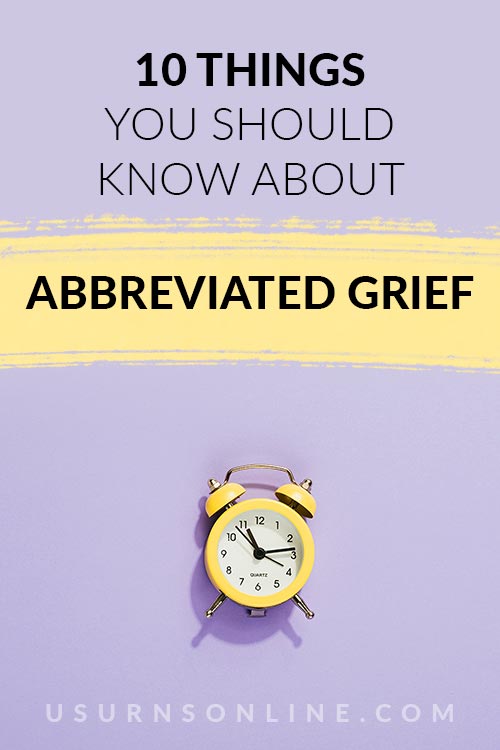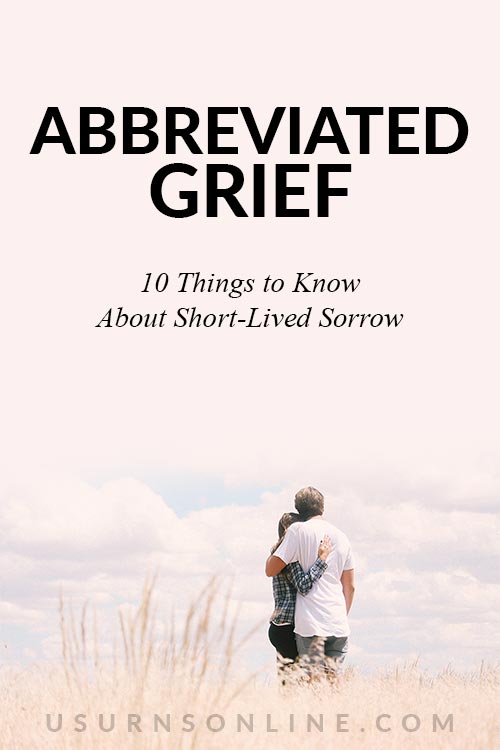Your loved one has passed on, and you’ve mourned their death and have tried to honor their life.
But is it too soon? Do you feel like you haven’t wept enough?
Are you worried that you haven’t grieved properly?
There are many different kinds of grief. Today, we will be discussing abbreviated grief. Should you feel guilty if you don’t mourn for weeks, months, or years? Read on.
What Is Abbreviated Grief?
Abbreviated grief is a genuine but short-lived grief. This type of grief can happen with death after a terminal illness or a lack of attachment to the deceased person.
It’s important to grieve. It’s also important to know that everybody grieves in their own way and in their own timeframe.

Is abbreviated grief bad?
Abbreviated grief can manifest in the future because you may not resolve it in the present. You may fill the void in your life too quickly. An example would be re-marrying very soon after you’ve lost your spouse.
How do I know if my abbreviated grief is real?
Abbreviated grief is very real. It can be abbreviated, or shortened, due to different circumstances. But just because it is shortened doesn’t make it any less intense or real.
- Abbreviated grief can occur because of immediate replacement of the deceased.
- When a widow or widower remarries quickly after the death of a spouse.
- A couple gets pregnant immediately following a miscarriage.
- Abbreviated grief can happen when a distant relative dies.
- This can be true for anyone that didn’t know or have a relationship with the deceased.
- Abbreviated grief can set in when you have had anticipatory grief.
- You may not mourn as intensely when you have anticipated a death for a number of months. You will still grieve, but it may be shortened because you have already grieved before the death actually happened.
How long does grief usually last?
Unfortunately, grief has no timetable. You may start to feel better in a few weeks. But, the whole process of grief can take a few years to work through.
Grief, for most people, is a long process. Don’t rush yourself, and don’t be alarmed if you have a setback now and again.
Urns Made in the USA
Learn more: How Long Does Grief Last? A Helpful Grief Timeline
10 Things to Know About Abbreviated Grief
1. Grief is a natural process.
Feeling grief is natural, even if it is for a short period of time. People’s reasons for grieving quickly or not at all depend on their individual experiences and relationships.
2. Children can feel abbreviated grief.
Depending on the child’s age and degree of relationship with the decedent, children can feel abbreviated grief. This is fairly normal.
While you may want to continue talking about their feelings and perhaps sharing memories of the decedent, it is not unusual for children to seem to “get over it” more quickly than adults.
3. You don’t need someone you care about to die to experience grief.
Life-changing events can cause you to grieve, it isn’t always a death that makes you feel grief. Grief can be triggered by any loss.
Attachment is a significant key to feeling grief. The loss of the “familiar” will cause a person to feel heartbreak.
- Divorce
- Job loss
- Loss of a friendship
- The loss of personal items
- Discovering you cannot have children
The grieving process allows you to adapt to these changes in your life. It is important to understand that grief and depression are different from each other.
4. Abbreviated grief does not mean that a person is not grieving.
It doesn’t always mean that they didn’t have a close tie or bond with the person who passed. There can be a number of reasons why abbreviated grief occurs, including prolonged or delayed grief.
5. Abbreviated grief can affect your health.
Grief, no matter how short or long-lived can affect your health in an adverse way.
- Interrupted sleep
- Rise in blood pressure
- Heart palpatations
- Physical aches and pains
- Have trouble concentrating
- Depression
If you are having health problems due to your grief, please see a doctor and get the help you need. There is no shame in reaching out for help.
6. You do not need to feel guilt over abbreviated grief.
You may feel pressure to prolong your suffering. Outsiders may “judge” you for not mourning the way they think you should.
Don’t pay them any mind. Everyone mourns differently and at their own speed. Grief takes its own time. Be it fast or slow, it will follow its own course.
7. Beware of abbreviating your grief by numbing your feelings.
You may be tempted to numb your feelings with drugs, alcohol, food, or even work. Please don’t. These are temporary fixes that won’t make you heal faster or feel better in the long run. These crutches can lead to addiction, depression, and anxiety.
Feel your grief and work through it. It’s uncomfortable and even painful, but it’s best to let it happen naturally.
8. Take care of yourself.
Abbreviated grief may not last a long time, but you must remember to continue taking care of yourself. Continue to exercise, get enough sleep, and eat properly.
This might be the perfect time to join or gym, start a Zumba class or even take those cooking lessons you’ve been wanting to take.
9. Can I be happy and grieve at the same time?
Laughing and smiling are healthy responses to loss. Remember the good times you shared and celebrate the feelings you had for each other.
Dr. George Bonanno studies how people cope with loss and trauma at Columbia University. He found that people who express flexibility in their emotions often cope better with loss and are healthier over time.
“It’s not about whether you should express or suppress emotion, but that you can do this when the situation calls for it,” he says. For instance, a person with emotional flexibility can show positive feelings, like joy, when sharing a happy memory of the person they lost and then switch to expressing sadness or anger when recalling more negative memories, like an argument with that person.
10. Grief is a form of love.
Grief is a form of love, but the time you grieve is not necessarily equal to the amount of love you felt for the decedent.
Accept your feelings of grief; know that grieving is a process and it takes the time that it takes. Grief is a method of letting go and learning to live with loss. This is a natural process that we will all go through at some point.
Take care of yourself and don’t put off seeking help if you need it.
Pin It





